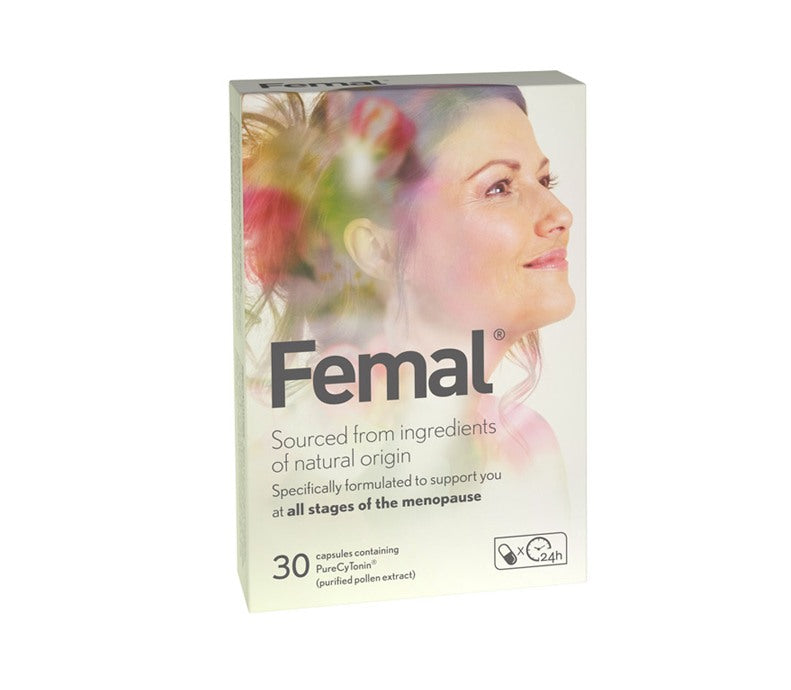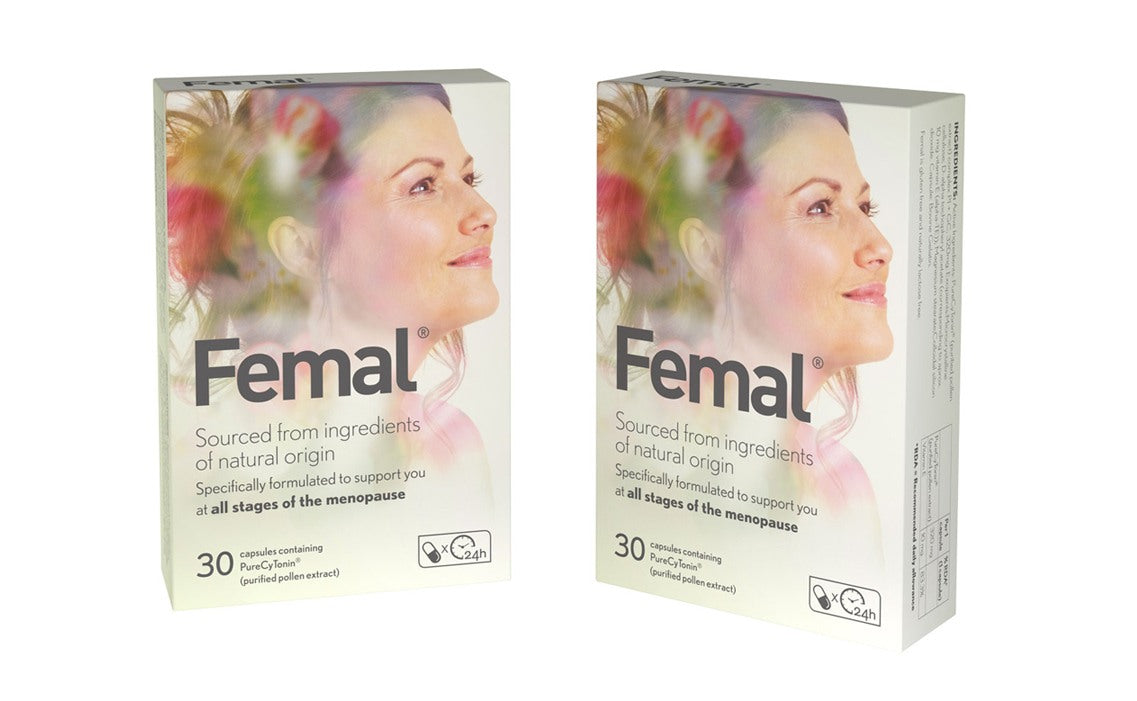What does a menopause friendly diet look like?

A healthy diet and lifestyle goes a long way at any time in your life, but it’s especially true with menopause. In my job as a nutritionist, I see firsthand the improvements women make to their health simply by syncing their diet to their body’s needs. Below I’ve outlined some simple lifestyle adjustments you can enlist to help make the hormonal transition through midlife less disruptive.
Heart Felt
There’s no one way that everyone should eat - we’re all biochemically unique - but the Mediterranean diet is a good yardstick to have in the back of your mind. It focuses on fresh fruits and vegetables, whole grains, healthy fats like avocado and olive oil, together with oily fish like salmon, mackerel, trout, sardines and kippers.
It’s worth noting that the Mediterranean diet doesn’t exclude alcohol and red meat, but it does limit them. Interestingly this way of eating is associated with the highest life expectancy and lowest rate of heart disease in the world[i]. And heart disease is something that every menopausal woman should be aware of, as falling oestrogen levels put us at higher risk of future cardio complications[ii]. Other risk factors include: high saturated fat and salt intake, smoking, obesity, diabetes and high blood pressure[iii].
Colour Me Happy
To help manage the fluctuations in your body, it’s important to eat a balanced diet that’s rich in variety.
The best way to do this is to eat the rainbow by including lots of different colours on your plate at each meal. You also need to keep your blood sugar levels consistent to counteract fatigue and level out mood. How? By making sure you’re eating a palm sized source of protein with each meal and a small handful of protein with each snack. Good sources are fish, poultry, eggs, tofu, edamame beans, peas, lentils, nuts, and chickpeas[iv].
Aim for 10 portions of fruit and vegetables a day and around 30 different plant sources each month[v],[vi]. This ensures plenty of fibre, antioxidants and diversity, all of which are crucial for good gut health[vii]. Don’t be scared of healthy fats either, they’re essential for hormone production, as well as giving your skin a healthy glow[viii]. Look to oily fish, nuts, seeds, avocados and olive oil.
Call for Calcium
Osteoporosis, which translates as ‘porous bone’, is a disease in which bones become brittle and fragile, making them more susceptible to fractures and breaks[ix]. It’s frequently deemed ‘the silent killer’ as fractures from weakened bones can be deadly[x]. 1 in 2 menopausal women are affected[xi]. Whether you’re in your thirties, forties or fifties, healthy bones rely on calcium so it’s paramount you include adequate amounts of this mineral in your diet.
The UK recommended daily intake is 700mg a day for women under 50 and 1200mg for women over 55[xii]. Food sources include dairy, sardines, cabbage, kale, broccoli, fortified milk and tofu (check labels)[xiii],[xiv].
Vitamin D is also essential for bone health and the sun is our best source[xv]. Because the northern hemisphere isn’t exposed to much sunlight in winter months it’s definitely worth supplementing with 10mcg daily between October and March if you live in the UKxv.
Bone is a living tissue that grows stronger in reaction to increased loads and forces. Weight-bearing exercises that use your body weight (such as jogging, walking, skipping, tennis) and weight resisted exercise (such as ashtanga yoga) both help to improve bone density[xvi].
Common Triggers
Hot flushes are one of the most common perimenopause symptoms - 3 in 4 women suffer - and can be incredibly debilitating[xvii]. They’re often triggered by stress, caffeine, alcohol and smoking[xviii] (incidentally, a recent study showed women who stopped smoking at least five years before menopause had a significant decrease in the severity and frequency of hot flushes)[xix].
To keep on top of them, make sure you remain well hydrated and try eating phytoestrogen rich foods such as tofu, flaxseeds, alfalfa sprouts and sesame seeds regularlyxiv.
Beyond Diet
Regular exercise improves metabolism, bone density, pain tolerance, mood, energy and quality of life[xx]. It can help you feel more confident and may help ease the stress of menopause symptoms. It strengthens your heart and positively impacts sleep.
Not exercising puts you at increased risk for heart disease, high blood pressure and other chronic health problems[xxi]; it can also lead to weight gain, fatigue, insomnia and depression, all of which can worsen during the transition into menopause[xxii],[xxiii].
According to the NHS, exercising at a moderate rate for as little as thirty minutes five days a week, together with strength conditioning on at least two occasions per week, has been shown to have immediate health benefits[xxiv].
My top tip here is to find a type of exercise that you enjoy so that it’s fun, rather than a chore. Activities such as running, boxing, weight lifting, walking, yoga, tennis and dancing can all help to keep you fit and healthy. As an added bonus, exercise can also help keep your muscles healthy by increasing blood flow and sending key nutrients to help maintain healthy bones.
So now you’ve learned a little more about how you can tackle the transition through menopause. The good news is it’s never too late or early to start instigating change. Even small nutrition and lifestyle shifts can make a sizable impact on how you’re feeling.
Talking through your symptoms can be a huge source of support and comfort too and should never be underestimated. The more we open up and tackle the conversation around menopause, the less daunting the process becomes. It’s good to know you’re not alone. For more insights and to hear about other women’s journeys, click here [www.femal.co.uk/pages/expressyour] or join the conversation on social media with #ExpressYourFemal.
[i] Lopez-Garcia E, et al. The Mediterranean-style dietary pattern and mortality among men and women with cardiovascular disease. Am J Clin Nutr 2014;99:172–180.
[ii] Baker L, et al. The role of estrogen in cardiovascular disease. J Surg Res 2003;115:325–344.
[iii] National Health Service. Risk factors for cardiovascular disease [online] September 2018. Available from: https://www.nhs.uk/conditions/cardiovascular-disease/ [Last accessed: January 2020].
[iv] British Nutrition Foundation. Current events [online]. Available from: https://www.nutrition.org.uk/bnfevents/events/63-healthyliving/healthydiet/719-protein.html?limitstart=0 [Last accessed: January 2020].
[v] National Health Service. Five-a-day of fruit and veg is good, but ‘10 is better’ [online] February 2017. Available from: https://www.nhs.uk/news/food-and-diet/five-a-day-of-fruit-and-veg-is-good-but-10-is-better/ [Last accessed: January 2020].
[vi] My Menopause Doctor. Top Lifestyle Tips for a Healthy Menopause (Fact Sheet), by Dr Hannah Short [online]. Available from: https://www.menopausedoctor.co.uk/menopause/top-lifestyle-tips-for-a-healthy-menopause-fact-sheet# [Last accessed: January 2020].
[vii] Biomebliss. The microbiome diet [online]. Available from: https://www.biomebliss.com/the-microbiome-diet/ [Last accessed: January 2020].
[viii] HelpGuide. Diet and Nutrition Tips for Women [online] June 2019. Available from: https://www.helpguide.org/articles/healthy-eating/diet-and-nutrition-tips-for-women.htm [Last accessed: January 2020].
[ix] National Health Service. Overview: Osteoporosis [online] June 2019. Available from: https://www.nhs.uk/conditions/osteoporosis/ [Last accessed: January 2020].
[x] Parsons LC. Nurs Clin North Am 2005;40:119–133.
[xi] Better Health Channel. Menopause and osteoporosis [online]. Available from: https://www.betterhealth.vic.gov.au/health/conditionsandtreatments/menopause-and-osteoporosis [Last accessed: January 2020].
[xii] Patient. Calcium-rich Diet, by Dr Mary Harding [online]. Last edited 29 Aug 2017. Available from: https://patient.info/bones-joints-muscles/osteoporosis-leaflet/calcium-rich-diet [Last accessed: January 2020].
[xiii] Dairynutrition. Calcium and Bioavailability [online]. Available from: https://www.dairynutrition.ca/nutrients-in-milk-products/calcium/calcium-and-bioavailability [Last accessed: January 2020].
[xiv] British Nutrition Foundation. Healthy eating and the menopause [online]. Available from: https://www.nutrition.org.uk/bnfevents/events/86-healthyliving/lifestages/242-menopause.html?start=2 [Last accessed: January 2020].
[xv] The Scientific Advisory Committee on Nutrition. Vitamin D and Health [online] 2016. Available from: https://assets.publishing.service.gov.uk/government/uploads/system/uploads/attachment_data/file/537616/SACN_Vitamin_D_and_Health_report.pdf [Last accessed: January 2020].
[xvi] National Health Service. Exercises for strong bones [online] March 2018. Available from: https://www.nhs.uk/live-well/exercise/exercises-for-strong-bones/ [Last accessed: January 2020].
[xvii] Healthtalk.org. Menopause: Hot flushes and sweats [online]. Available from: https://healthtalk.org/menopause/hot-flushes-and-sweats [Last accessed: January 2020].
[xviii] National Health Service. Hot flushes: Menopause [online] August 2018. Available from: https://www.nhs.uk/conditions/menopause/hot-flushes/ [Last accessed: January 2020].
[xix] Smith RL, et al. Maturitas 2015;82:123–127.
[xx] Healthline. The Top 10 Benefits of Regular Exercise [online]. Available from: https://www.healthline.com/nutrition/10-benefits-of-exercise#section3 [Last accessed: January 2020].
[xxi] Booth FW, et al. Compr Physiol 2012;2:1143–1211.
[xxii] WebMD Symptom Checker Conditions. Lack of Exercise [online]. Available from: https://symptoms.webmd.com/symptomcheckercondition?condition=091e9c5e808e8184&bpid[0]=66&sid[0]=98&bpid[1]=66&sid[1]=290&bpid[2]=66&sid[2]=256 [Last accessed: January 2020].
[xxiii] Sternfeld B, et al. Menopause 2014;21:330–338.
[xxiv] National Health Service. Physical activity guidelines for adults aged 19 to 64 [online] October 2019. Available from: www.nhs.uk/live-well/exercise [Last accessed: January 2020].
-->

Femal One Pack
30 capsules - 1 Month Supply
Customer loyalty programme*:
*Discount code not applicable on loyalty programme
Free shipping

Femal Two Pack
60 capsules - 2-Month Supply
Customer loyalty programme*:
*Discount code not applicable on loyalty programme
£56.31
Free shipping
